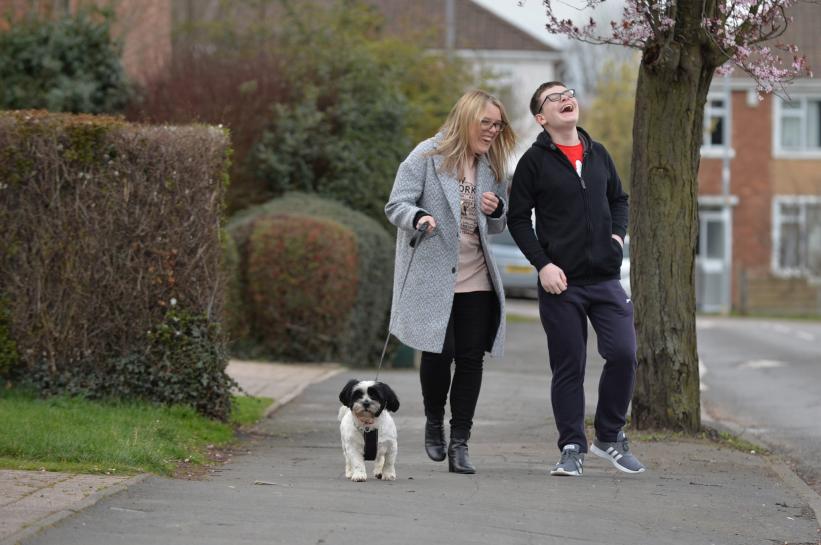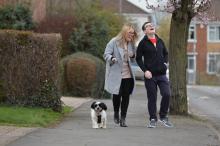
Over the years, Hayley and Tommy have done extraordinary, fun, innovative and effective fundraising for MDUK. Now self-employed, Hayley also volunteers for MDUK on our Content Advisory Group, and represents the charity by sharing her story at a number of events. It’s hard to imagine she has time for anything else, but Hayley also enjoys keeping fit, dog-walking and writing. Tommy loves gaming and cooking.
Here, Hayley tells us what it means to live with a muscle-wasting condition, and what the emotional impact is on her too:
In 2012, Tommy was diagnosed with LGMD2E after two years of investigation into his toe walking. After trying leg plasters and special boots to get his toes down, Tommy was given a blood test, which showed an elevated level of CK*. This indicated muscular dystrophy.
Tommy was six when he got this diagnosis, and I think at 13 he’s doing brilliantly. His consultant told me Tommy would be in a wheelchair full-time by his mid-teens. Although he does need a wheelchair for long distances, he can still walk short distances. He isn’t able to climb stairs, get off the ground (by himself) and he falls regularly. I’ve lost count of the number of times we’ve been at A&E.
MDUK has been a support and help to me and all my family, since Tommy’s diagnosis. They have helped me with fundraising, with supporting communications for Tommy’s Education Health and Care Plan (EHCP) application, with event days to meet other families with muscular dystrophy, and with help answering research questions.
I can do things, Mum, I’m fine
Although Tommy now struggles getting up from a chair and dressing himself, he’s very determined and will always say, “I can do things, Mum, I’m fine,” but that isn’t the reality. He can’t keep up with his friends; he can’t play sports or do PE at school. He is fighting against his condition.
As a teenager, Tommy wants to be like everyone else his age. He hasn’t really accepted having to use his wheelchair. He doesn’t want people to see him in it – he says he’s embarrassed. It becomes very difficult, when all I want to do is make things easier for him and he’d rather struggle and be in pain.
I try to keep positive and live for the present
Living with a child with muscular dystrophy has affected me significantly. It’s all-consuming. I found juggling a stressful job and Tommy’s condition difficult, so two years ago I made the huge jump to resign. Since then I’ve been self-employed and have done some contract work.
Tommy has time off school for falls, for physio appointments, consultant appointments and for school review meetings too.
It would be impossible for me to be employed with the amount of time I’d need off, and unfortunately, I don’t have a partner to support me with this.
I try to keep positive and live for the present. We also try to laugh a lot. But I have been seeing a counsellor since Tommy was diagnosed. I still see her monthly, and it’s a godsend for me.
It’s a time when I can cry, get angry or just talk about how I feel. I have also started to suffer with anxiety too, which has completely floored me for weeks at a time. I have received help from the GP with this.
Diagnosis is scary
If you’re facing a new diagnosis of muscular dystrophy, I’d say to you that diagnosis is scary. I felt helpless; guilty that I couldn’t do anything to change the situation. It’s important to be gentle with yourself. Every emotion is temporary and there are more good days than bad as time goes on.
Life is about adapting, doing things differently. And we try to do this as best we can.
Counselling really helps me, although I have to pay for it myself. I asked for help for Tommy through the GP, but Child and Adolescent Mental Health Services (CAMHS) has told me they only deal with children with mental health problems. They referred me to MDUK or to his school for support.
Our children need emotional and psychological help too
Mental health really matters. As parents, we’re petrified of how our children feel, knowing they have a progressive muscle-wasting condition. I can’t imagine how that feels and I’m Tommy’s Mum.
Without a service, an outlet to express his feelings, I fear depression, anxiety and, sometimes, even worse.
That’s why MDUK’s campaign to improve access to emotional support for adults and children living with muscle-wasting conditions is so important. Our children don’t just need physical help, they need emotional and psychological help too. Being able to talk about their condition, about how they feel, and expressing their anger or frustrations is so important.
Find out how MDUK can help you get the emotional support you need at www.musculardystrophyuk.org/mental-health-matters
*creatine kinase – a type of protein found in muscle, which leaks into the bloodstream when muscles are damaged because of disease or injury.
If you would like to share your story, fill in the form below
Share your story

